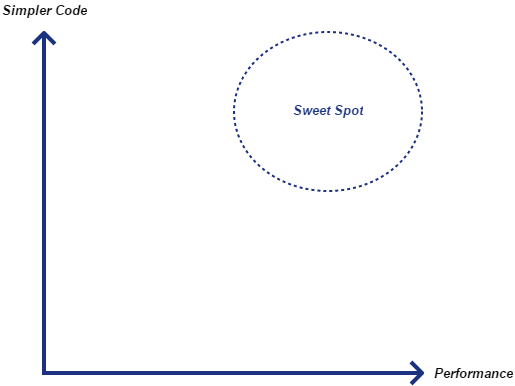Rust vs. Go: Should I Rust, or Should I Go
“Should I stay, or should I go?” Great song by the band The Clash. I’m listening to it, right now, while I’m writing this article. The song debuted back in 1982, a long time ago. Back then, I was just a kid exploring a new hobby — programming my Atari 2600. The first video game I ever wrote was written using 6502 Assembly for that console. The compiler for it cost about $65, if I recall, which at the time equated to mowing ~13 or so lawns.
The game was simple: using the joystick, maneuver your spaceship through a randomly generated scrolling cave. The cave walls were sinusoidal, scrolling vertically on the left and right sides of the screen, and you had to make sure your craft didn’t crash into them. I know, I know: Not that sophisticated. But I was only ten or eleven years old at the time.
Despite the “power” of the processor, computing sine values at run-time was simply too much for it. So, using my handy Texas Instruments calculator, I pre-calculated a bunch of the sine values, carefully writing them down on paper, and then entering them in as constants for the game. This greatly enhanced the performance of the game, and made it usable.
So what’s my point? What’s any of this got to do with Rust or Go?
Today’s languages are far more advanced than 6502 Assembly, which make it easier to write complex programs. It took a lot of my time to write that game, and I could do it much faster today, with less code than I did back then. But which language today provides that magic combination of simplicity and power?
Well both Rust and Go provide amazing performance. They both compile to machine code, the Holy Grail of performance. And with today’s processing power, developers can do amazing things with either of these languages. So the question is: Should you write you’re next big thing with Rust or with Go?
With a quick search, you can easily find several articles that go into detail about the differences between the two languages. But the focus of this article is the bang for the buck, that magic combination of performance per line of code.

To put it another way, where is that sweet spot of simple code and top-end performance? And in this case, is it Rust, or is it Go?
There really isn’t any argument: Rust is faster than Go. In the benchmarks above, Rust was faster, and in some cases, an order of magnitude faster.
But before you run off choosing to write everything in Rust, consider that Go wasn’t that far behind it in many of those benchmarks, and it’s still much faster than the likes of Java, C#, JavaScript, Python and so on. So in other words, it’s almost a wash between Rust and Go on the axis of performance. Now, if what you’re building needs to wring out every last ounce of performance, then by all means, choose Rust. But if what you need is top-of-the-line performance, then you’ll be ahead of the game choosing either of these two languages.
So then we’re down to the complexity of the code. This is where things can be muddy since this can be more subjective than performance benchmarks. Let’s look at a simple exercise: building a small web server that prints out “Hello World” when it receives an HTTP request. To do this in Rust, it looks something like this:
use std::net::{TcpStream, TcpListener};
use std::io::{Read, Write};
use std::thread;
fn handle_read(mut stream: &TcpStream) {
let mut buf = [0u8; 4096];
match stream.read(&mut buf) {
Ok(_) => {
let req_str = String::from_utf8_lossy(&buf);
println!("{}", req_str);
},
Err(e) => println!("Unable to read stream: {}", e),
}
}
fn handle_write(mut stream: TcpStream) {
let response = b"HTTP/1.1 200 OK\r\nContent-Type: text/html; charset=UTF-8\r\n\r\n<html><body>Hello world</body></html>\r\n";
match stream.write(response) {
Ok(n) => println!("Response sent: {} bytes", n),
Err(e) => println!("Failed sending response: {}", e),
}
}
fn handle_client(stream: TcpStream) {
handle_read(&stream);
handle_write(stream);
}
fn main() {
let port = "8080";
let listener = TcpListener::bind(format!("127.0.0.1:{}", port)).unwrap();
println!("Listening for connections on port {}", port);
for stream in listener.incoming() {
match stream {
Ok(stream) => {
thread::spawn(|| {
handle_client(stream)
});
}
Err(e) => {
println!("Unable to connect: {}", e);
}
}
}
}
Something pretty similar in Go looks like this:
package main
import (
"fmt"
"io"
"log"
"net/http"
)
type handler struct{}
func (theHandler *handler) ServeHTTP(writer http.ResponseWriter, request *http.Request) {
log.Printf("Received request: %s\n", request.URL)
log.Printf("%v\n", request)
io.WriteString(writer, "Hello world!")
}
const port = "8080"
func main() {
server := http.Server{
Addr: fmt.Sprintf(":%s", port),
Handler: &handler{},
}
server.ListenAndServe()
}
Now, they are not 100% exactly the same, but they are close enough. The difference between them is ~20 lines of code. Rust definitely forces the developer to consider more, and thus write more code than Go.
Another example: Consider one of the more difficult aspects of software development: multi-threading. When tackling something like this, as you undoubtedly would when building an HTTP server, there’s a lot to think about:
- You need to ensure everything you design is thread safe (locks)
- You need to handle communication between threads (channels)
- You have to design with concurrency and parallelism in mind (threads and routines)
Both Rust and Go handle these hurdles really efficiently, but Go requires less effort. With Rust, you have way more options, and thus more power, when spawning threads. Just look at some of the documentation on this. Here’s just one way to spawn a thread in Rust:
use std::thread;
let handler = thread::spawn(|| {
// thread code
});
handler.join().unwrap();
On the other hand, here’s how to create something similar using Go:
go someFunction(args)
Another crucial part of writing code is handling errors. Here I think Rust and Go are quite similar. Rust enables the developer to handle errors cases through the use of the enum return types: Option<T>and Result<T, E>. The Option<T> will return either None or Some(T) whereas Result<T, E> will return either Ok(T) or Err(T). Given that most of Rust’s own libraries, as well as other third-party libraries, return one of these types, the developer will usually have to handle the case where nothing is returned, or where an error is returned.
Here’s a simple example of the Result type being returned by a function in Rust:
fn foo_divide(a: f32, b: f32) -> Result<f32, &'static str> {
if b == 0.0 {
Err("divide by zero error!")
} else {
Ok(a / b)
}
}fn main() {
match foo_divide(5.0, 4.0) {
Err(err) => println!("{}", err),
Ok(result) => println!("5 / 4 = {}", result),
}
}
Notice that the Err case must be handled within the match statement.
Go, on the other hand, leaves this more up to the developer, since errors can be ignored using the _. However, idiomatic Go strongly recommends returning an error, especially since functions in Go can return multiple values. Therefore, it’s easy to have functions return their intended value along with an error, if there is one.
Here is the corresponding example from above done in Go:
func fooDivide(a float32, b float32) (float32, error) {
if b == 0 {
return 0, errors.New("divide by zero error!")
} return a / b, nil
}func main() {
result, err := fooDivide(5, 4)
if err != nil {
log.Printf("an error occurred: %v", err)
} else {
log.Printf("The answer is: 5 / 4 = %f", result)
}
}
Notice that this line:
result, err := fooDivide(5, 4)
could have been written as
result, _ := fooDivide(5, 4)
In the latter case, the error returned would have been ignored.
Honestly, they’re both pretty similar, except for Rust forcing error checking. Otherwise, there’s little difference, and it’s difficult to find an advantage one has over the other. To my eyes, this is a draw.
I could keep going, digging deeper into other language differences. But the bottom line, from threads, to channels, to generics, Rust provides the developer with more options. In this respect, Rust is closer to C++ than Go. Does this make Rust inherently more complex?
I think so, yes.
So here are my recommendations:
- Either. If you’re building a web service that handles high load, that you want to be able to scale both vertically and horizontally, either language will suit you perfectly.
- Go. But if you want to write it faster, perhaps because you have many different services to write, or you have a large team of developers, then Go is your language of choice. Go gives you concurrency as a first-class citizen, and does not tolerate unsafe memory access (neither does Rust), but without forcing you to manage every last detail. Go is fast and powerful, but it avoids bogging the developer down, focusing instead on simplicity and uniformity.
- Rust. If on the other hand, wringing out every last ounce of performance is a necessity, then Rust should be your choice. Rust is more of a competitor to C++ than it is with Go. Having battled with C++, Rust feels just as powerful but with many happy improvements. Rust empowers developers to have control over every last detail of how their threads behave with the rest of the system, how errors should be handled, and even the lifetime of their variables!
- Rust. Rust was designed to interoperate with C. Go can as well, but gives up a lot to achieve this goal, and it’s not really its focus.
- Go. If readability is a requirement, go with Go. It’s far too easy to make your code hard for others to grok with Rust.
I hope you enjoyed reading this!
#go #rust #webdev
